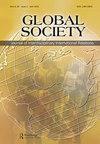“Reverse Discourse” Revisited: Cracks, Formations, and a Complex Understanding of Power
IF 2.3
Q2 INTERNATIONAL RELATIONS
引用次数: 1
Abstract
Notable scholars within International Relations (IR) have nuanced the concept of resistance, as well as, more generally, paving the way for acknowledging how Foucauldian approaches support thinking about resistance within IR (see e.g. Death 2016; Odysseos, Death, and Malmvig 2016; Lilja and Vinthagen 2014; Malmvig 2016). Based on this theme, this special issue aims to further carve out forms and nuances of resistance. Not surprisingly, there are several papers in Global Society that address creative responses to power, as well as power’s responses back. Not least, a recent special edition of the journal has made the study of resistance more complex by embracing “counter-conducts”; that is, a concept that was recently recovered fromMichel Foucault’s Security, Territory, Population (2009) lectures. We find the constructive use of the concept of counter-conducts interesting and original. However, in our thinking, the valorisation of the concept, in some senses, leads to an omission of Foucault’s multiple forms of resistance. Resistance, in Foucault’s texts, is sometimes described as resistance against authorities (sometimes the state and other governing units, and sometimes local authorities; Foucault 2009, 201; Foucault 1982, 329–331; Foucault 1991, 149). In other texts, however, he describes resistance as a discursive phenomenon. Discursive resistance, which appears as repetitions of signs across time, more generally, does not signal major ruptures, breaks or discontinuities. Indeed, this resistance, which occasionally aims to establish alternative truths, could be seen as a slow-motion form of resistance as it suffers from the inescapable time-lag of processes of signification (Lilja 2021, 2018). It is the strategic codification of different points of resistance that, in the end, becomes the hotbed for radical social change (Foucault 1990, 96; Bhabha 1994). Sometimes, these more linguistic forms of resistance take the form of reverse discourse. According to Foucault (1990, 101–102):“反向话语”再访:裂缝、形成与对权力的复杂理解
国际关系领域的著名学者对抵抗的概念进行了细致入微的研究,更广泛地说,为承认福柯的方法如何支持对国际关系中抵抗的思考铺平了道路(例如,见《死亡》2016;奥德修斯、《死亡》和《马尔姆维格》2016;Lilja和Vinthagen 2014;马尔姆维格·2016)。基于这一主题,本期特刊旨在进一步挖掘抵抗的形式和细微差别。毫不奇怪,《全球社会》上有几篇论文论述了对权力的创造性回应,以及权力的回应。不仅如此,该杂志最近的一期特刊通过包含“反行为”,使抵抗力的研究变得更加复杂;也就是最近从米歇尔·福柯(Michel Foucault)的《安全、领土、人口》(Security,Territory,Population)(2009)讲座中找到的一个概念。我们发现反行为概念的建设性使用既有趣又新颖。然而,在我们的思维中,在某些意义上,这个概念的价值化导致了福柯的多重抵抗形式的省略。在福柯的文本中,抵抗有时被描述为对当局的抵抗(有时是国家和其他管理单位,有时是地方当局;福柯2009,201;福柯1982,329–331;福柯1991,149)。然而,在其他文本中,他将抵抗描述为一种话语现象。更普遍地说,话语阻力表现为符号在时间上的重复,并不意味着重大断裂、断裂或不连续。事实上,这种偶尔旨在建立替代真理的抵抗,可以被视为一种慢动作的抵抗形式,因为它受到意义过程不可避免的时间滞后的影响(Lilja 2021,2018)。正是对不同抵抗点的战略编纂,最终成为激进社会变革的温床(福柯1990196;Bhabha 1994)。有时,这些更为语言化的反抗形式是反向话语。根据福柯(1990,101–102):
本文章由计算机程序翻译,如有差异,请以英文原文为准。
求助全文
约1分钟内获得全文
求助全文
来源期刊

Global Society
INTERNATIONAL RELATIONS-
CiteScore
3.10
自引率
6.20%
发文量
32
期刊介绍:
Global Society covers the new agenda in global and international relations and encourages innovative approaches to the study of global and international issues from a range of disciplines. It promotes the analysis of transactions at multiple levels, and in particular, the way in which these transactions blur the distinction between the sub-national, national, transnational, international and global levels. An ever integrating global society raises a number of issues for global and international relations which do not fit comfortably within established "Paradigms" Among these are the international and global consequences of nationalism and struggles for identity, migration, racism, religious fundamentalism, terrorism and criminal activities.
 求助内容:
求助内容: 应助结果提醒方式:
应助结果提醒方式:


